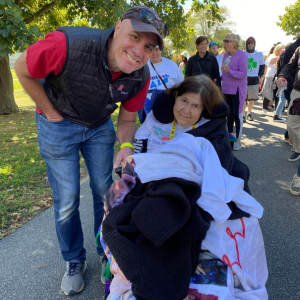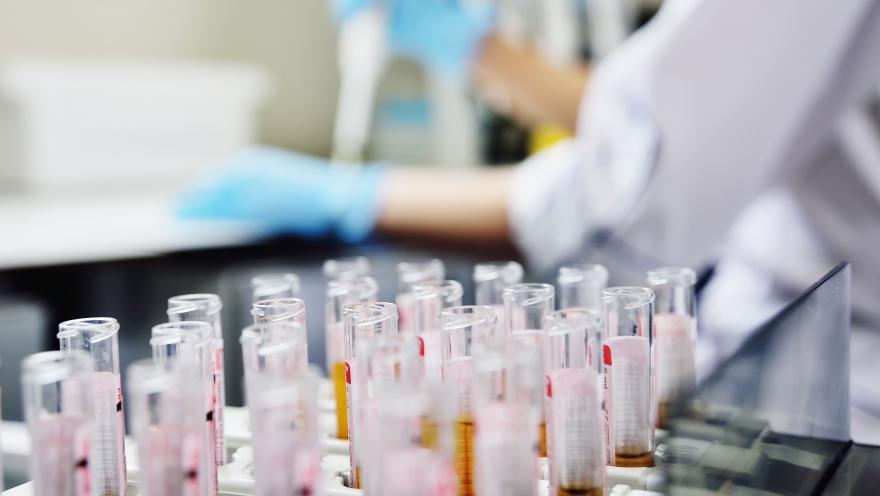While knowledge is power in many circumstances, knowing you have lost several members of your family to familial ALS, and understanding you may also carry the mutated gene, can be a heavy burden to live with. With technology continuously evolving, new potential treatments in the ALS research pipeline through clinical trials and the ability to get answers through a genetic test, there are more factors to consider today than ever before.

Peter Hackett says as far as he knows, the first person in his family to succumb to ALS was his grandmother. Diagnosed in 1957 at the age of 42, she passed away two years later when his mother was just 12 years old. Peter says there was some family chatter about his great-grandmother having some sort of neurological disease, although no one had proof it was ALS. She died in 1947 at the age of 59.
“It was very traumatic for my mom, obviously,” says Peter. “My mom's cousin was diagnosed with ALS in 1993 and he passed away in 1998. So once he got it, then it was like, ‘yeah, we definitely have the familial form of ALS.’” The thought of ALS has always been out there, he shared, even though there wasn't a lot known about it at the time.
“We had known there was a genetic component to it, but the only gene that was identified in the early nineties was SOD1, not the C9orf72 gene mutation that's in my mom's family.”
Peter remembers that in the mid-eighties, as his mother approached the age when her mother had been diagnosed, it was certainly on her mind. “She would talk about it,” he said, “but she wasn't paralyzed by it. But she was really having struggles with it.” He went on to say as his mother got older, say in her 50’s, the feelings began to subside. “I think she just didn't really worry about it as much as she thought she had passed that critical time, you know?”
Flash forward 20 years, when Peter’s mother started to develop ALS symptoms in 2018. “She had a dropped foot, that was the first thing, but she was not diagnosed with ALS until after she visited a number of neurologists for over a year, even though she had mentioned the history of ALS in the family; this is part of the problem with this disease, because the earlier you treat anything is better.” She was finally diagnosed with ALS formally in 2019 at age 70.
Peter is very frank about what familial ALS running in his family means for him and for his own family. It’s a burden that continues to weigh on him.
“It was always there, and it was always in the back of my mind. I've worried about the disease on and off my whole life.”
After his mother’s diagnosis and watching her progression with the disease, Peter decided to be genetically tested for the mutated gene that has impacted his family. “Ten years ago, I never could have done the test,” he said. “But I think now, I'm at a different stage in my life. I have a six-year-old daughter. I'm doing this for her.” Peter admits that having his daughter gave him the courage to find out the answer that has been looming on him, so hopefully she will not have the same weight to carry throughout her life.
“I think it's important to do it,” he shared, but went on to say that everyone has to make their own decision about genetic testing and do what’s right for them and their family. “I respect that. Like I said, I couldn't have done this 10 years ago, but now I'm very compelled and driven to do it, overcoming my fears, and doing it, you know?”
Peter says other than his parents, he doesn’t have many heroes in his life with the exception of Lou Gehrig. Peter’s grandfather worked at Yankee Stadium as a kid and was present for Lou’s final speech when he left baseball due to his diagnosis. Peter remembers the stories his grandfather told, and says he feels a unique connection there, admiring how Lou handled himself with such grace as he faced ALS.
“It's just crazy to think that 80 years+ down the road and there's still not a cure or a really an effective treatment,” he said.
“And I just hope that one day, we don’t have to do this in the future. That there's something to give people more hope. I don't want my daughter to have to worry about this.”
Special thanks to Peter Hackett for allowing us to share his thoughts and his family’s personal journey with ALS. Sadly, his mother recently lost her battle with ALS, making it all that much more important to spread awareness of this terrible disease.
More information about the benefits and risks of genetic testing for people living with ALS can be found HERE.
To continue to follow stories about people living with ALS in the community and learn more about the disease, subscribe to receive our weekly blogs in your inbox HERE or follow us at als.org/blog.


Comments
Our Son died of ALS at 53. He fought as long as he could. He was in the Drug industry and felt sure a cure would be found before he died. We still support research in his memory.
Patricia, our hearts go out to you and your family. Thank you for still supporting research in his memory.
Join the conversation. Please comment below.